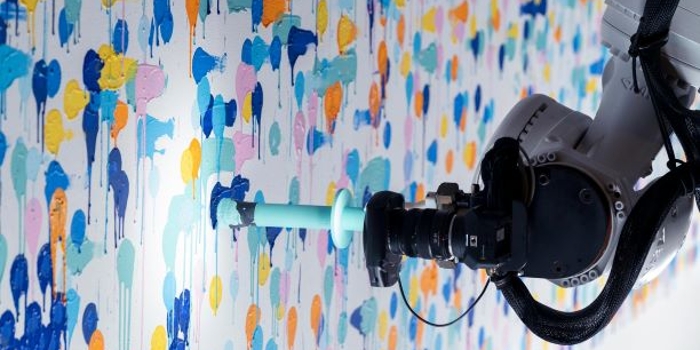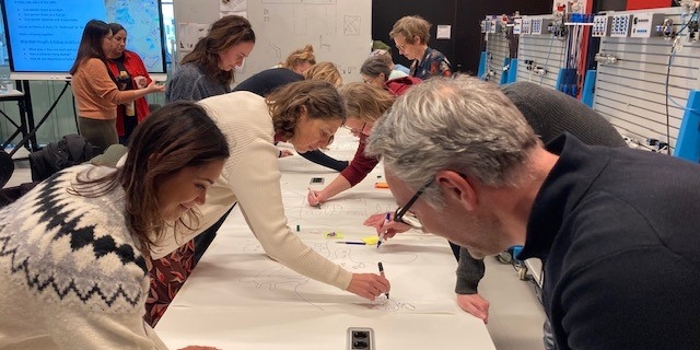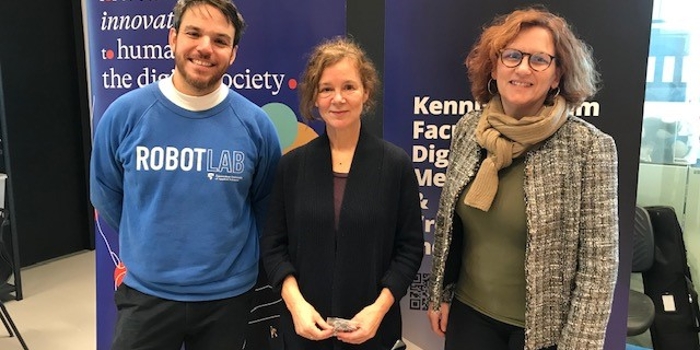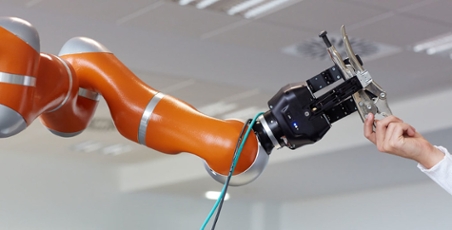Recap Food for Thought Inspiration Session November 2023
Collaborative Robotics. Unlocking the Future of Learning and Innovation
9 Jan 2024 11:47 | Centre for Applied Research FDMCIThe relationship between humans and robots is evolving into an increasingly symbiotic interplay. Ask yourself how often you actually interact with some form of robotics on a daily basis, like the smart hoover, for example. Soon you realise that robots have become indispensable. Instead of fearing world domination by robots, we actually experience enormous benefits, especially in sectors such as education and healthcare. This realisation leads to the use of the term 'cobots' - collaborative robots. This November edition of the Food for Thought inspiration session - which took place in the Robot Lab at the Faculty of Technology - was proof that robots can be seen as valuable partners that enrich, not threaten, our lives. The Centre for Applied Research FDMCI and CoECI thank the colleagues at the Robot Lab for the hospitable reception and great session. We look forward to continuing the collaboration!
Collaborative Robotics @ Robot Lab
The future of learning and innovation
Marco Galli, working at the Robot Lab, opened this Food for Thought session with a contribution on the transformative impact of 'collaborating with robots' in both educational and research environments. In doing so, he also explored the broader social implications.
Marco showed how 'cobots' are becoming valuable teaching tools, stimulating hands-on learning experiences, as well as co-creative and participatory processes in applied research.
He gave examples of how these technologies can improve different industries and talked about the related social implications, which range from replacing jobs to improving accessibility and inclusiveness.
Marta Malé-Alemany, Robot Lab Lead, acted as facilitator of the session.

Collaborative drawing with robots
Supporting creative experiences for older adults
The global population is ageing rapidly, with major social, economic and health implications. Extensive research has shown, that participating in creative activities can promote health and well-being and help prevent and delay age-related physical and cognitive decline.
Therefore, creative activities are widely organised for the elderly. Social robots offer unique opportunities to support creativity. In addition, advances in AI provide new opportunities to generate creative content.
However, it is still largely unexplored how technology can contribute to the creative experiences of older adults. This is the main focus of the PhD research of Marianne Bossema, who talked about it during this Food for Thought session. She shared her insight into the findings and developments so far.
Marianne is currently designing a course 'Drawing with robots' in collaboration with professional artists and art teachers. Students from HBO-ICT, CMD and the Robot Lab are contributing by developing AI and robot prototypes. The course provides a natural setting for participatory research, involving older people, artists, researchers and students. The course will explore how creativity arises between humans and robots, and how a social robot can contribute to the creative process.

Drawing experiment
During the second part of the Food for Thought session, all participants were encouraged to participate in an experiment: on one side of the tables, participants stood up and had to draw with a coloured marker on a large sheet of paper from the perspective of an older person with dementia.
Opposite each 'older person' stood a participant, who drew with a black marker on the same sheet of paper as if this person were the social robot, the computer.
The task was to make a drawing together from cooperation between 'human and robot', without any conversation taking place. In this way, a real-life situation was simulated as closely as possible.
This resulted in a very interesting, instructive interaction between the 'older person' and 'computer', with each duo having slightly different experiences. Finally, everyone reflected on their insights, which provided Marianne with very valuable feedback for the continuation of her research.
And, the participants were particularly enthusiastic about the way they were involved in this experiment!

About the speakers
Marco Galli is lecturer-researcher and programme coordinator Digital Production at the Robot Lab of the Faculty of Technology at the AUAS.
Marianne Bossema is a lecturer at HBO-ICT, and a researcher at the Research Lab Digital Life. She has been working as a creative software developer for more than 10 years, and contributed to the development of for example educational and serious games and museum installations.
She is involved in research projects around social robots for education, and healthcare & wellbeing. At the beginning of 2023 Marianne started her PhD research, working together with LIACS and the Creative Intelligence Lab at Leiden University and the AUAS Research Lab Digital Life.
During this research project, funded by NWO, she investigates how social robots and AI can enrich creative experiences for older adults, with a focus on human-robot collaborative drawing.
Since September 2023, Marianne has also been teacher-in-residence at the Robot Lab of the AUAS Faculty of Technology.
Marta Malé-Alemany is a doctor in architecture and exhibition curator, and (since 2016) active at AUAS as Associate Lector in Digital Production. She is the initiator and lead of the Robot Lab and oversees the Digital Production Research Group (DPRG) within the Lectorate of Circular Design and Business / CoE City Net Zero, at the Faculty of Technology.
DPRG has successfully executed multiple research projects, and is now part of an on-going EU Horizon initiative, exploring the potential of digital production in addressing societal challenges such as the Circular Transition. Her team’s work received the AUAS Best Research of the Year 2023 Award.
Marta’s commitment and visionary leadership behind the Robot Lab follows her core mission of integrating Practice, Research, and Education to enhance collaboration among students, teachers, and professionals.
With over 25 years of academic experience in well-known institutions in the USA and Europe, Marta brings extensive knowledge to her role. In these years, she founded 3 digital fabrication labs, directed several advanced Master and Post-graduate programs in Architecture and served as the Acting Director of an 300+ students prost-graduate institute.
This trajectory and her own research oriented, design-to-production practice (ReD) earned her being acknowledged in the field of architecture and digital production for contributing significantly to the advancement of these disciplines.

New Food for Thought Inspiration Sessions
In 2024, the Centre for Applied Research FDMCI continues the Food for Thought Inspiration Sessions in collaboration with CoECI, the Centre of Expertise for Creative Innovation. If you would like to join us, keep an eye on our announcements!

